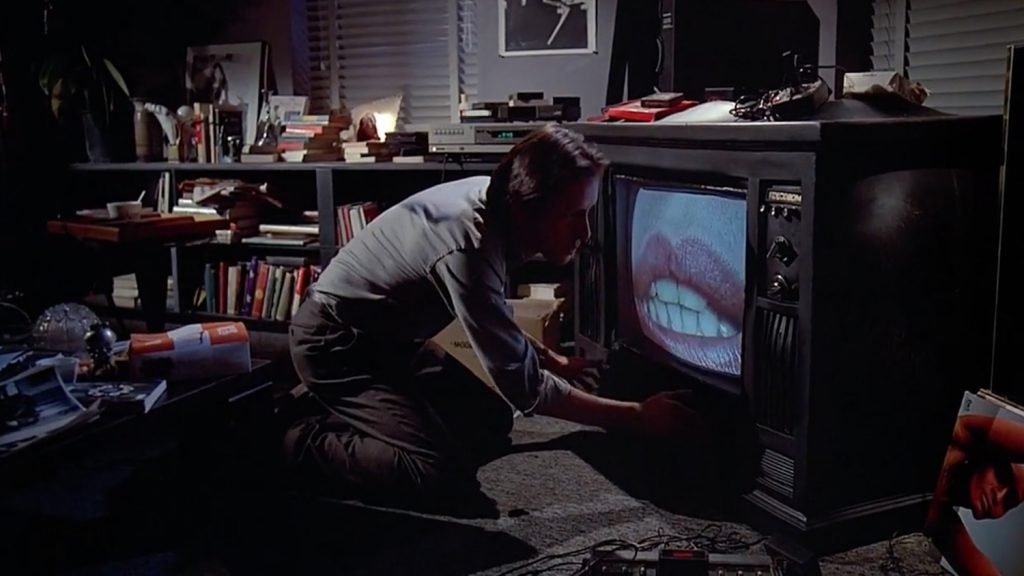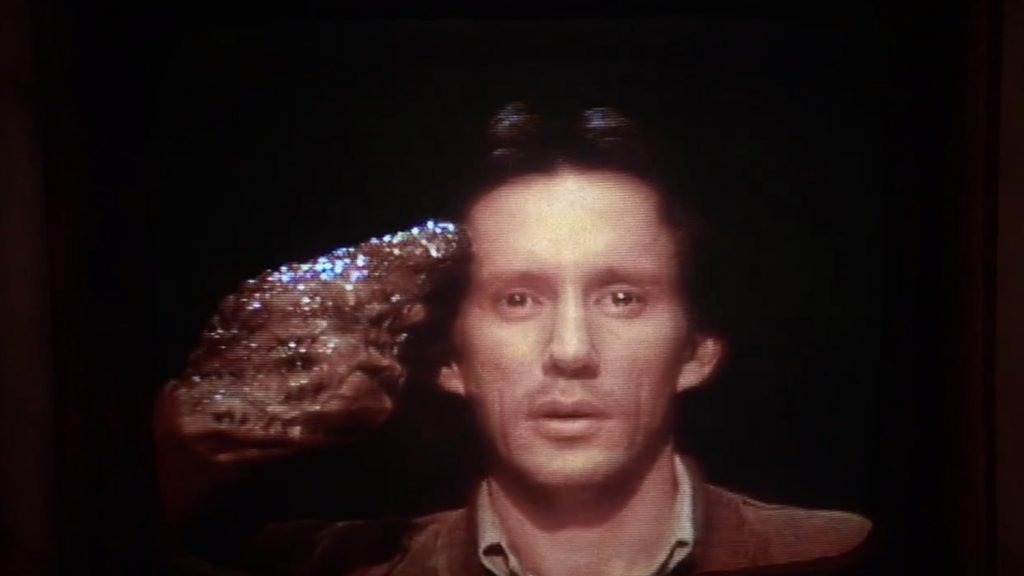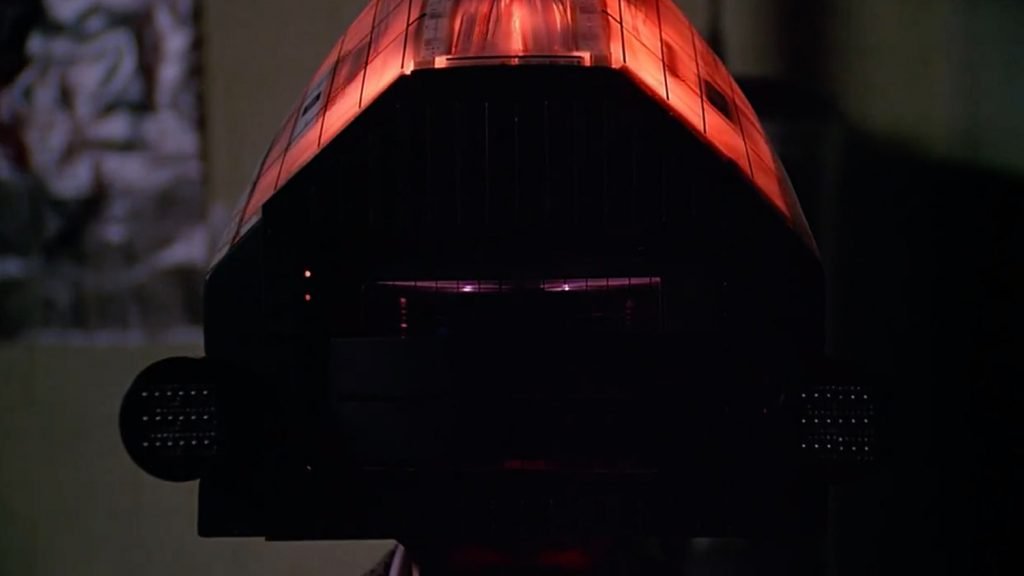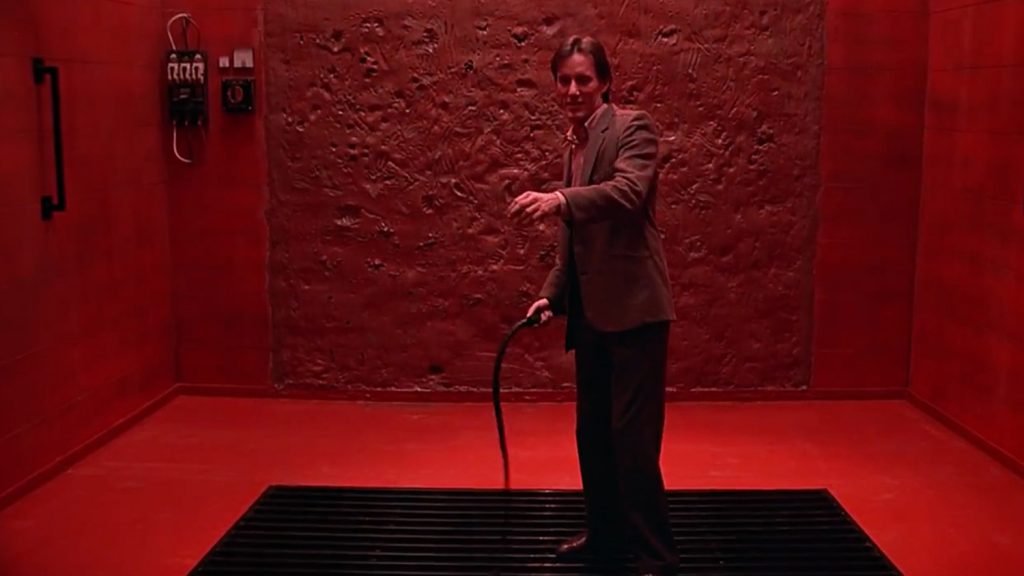“First of all, it can be said that eroticism is the approval of life right up to death.” Bataille
The famous phrase “Death to Videodrome, glory and life to the new flesh!” is the slogan with which Cronenberg’s cinema defines its theoretical manifesto.
In the decade of television, cathodic communication has forced the brain to correspond to sight in spite of itself; an effect that will later have the video game, virtual reality and the network. The image is already in itself desire and death. Already trap and initiation to loss.
Director of a channel of a private television channel specialized in pornography, Max Renn captures a strange program one day in which torture and murderers can be seen. To catch the program for Max is a station technician who managed to find the related images, which are produced for a sadistic program entitled “Videodrome”.
Videodrome is a snuff channel, an endless sequence of torture and mutilations without any narrative construction. Nothing but this. An uninterrupted obscenity program, broadcast by “laughing Pittsburgh”, one of the most historic cities in East, southwestern Pennsylvania.
From Videodrome “You can’t take your eyes off” confesses Max Renn, director of Civic TV on channel 83, a small television reality which, to increase audience ratings, has thought of specializing in pornography and extreme violence.
After all, what’s more peculiar in an eighties America engulfed in the race for economic domination – made even stronger one step away from the victory in the Cold War (without therefore the need to resort to physical confrontation anymore) – of the image and its exploitation to the extreme?
It is precisely that feared, sometimes provoked, physical confrontation that produces the signs that can also be traced in Videodrome, the video arena in which every type of aberration imagined and imaginable is allowed. It is real, provided that this term still makes sense in a universe in which communication has already become pervasive and founding the same narrative and imaginative structure.
Thirty-six years have passed since David Cronenberg’s masterpiece came out in theaters deserving the title of “definitive body horror”. An even reductive definition, because if it is true that the film marks the pinnacle of the Canadian director’s journey within the maze of horror interested in reflecting on flesh, on the mutation of the body and on psycho-physical degeneration as an automatic and natural reflection of social mutation, it is equally true that “Videodrome” is a work that broadens the horizon of research in a certain sense, ranging in the direction of the sociological philosophy of Herbert Marshall McLuhan and the reading of Guy Debord’s “The Society of the Spectacle”.
David Cronenberg arrives at “Videodrome” by going through some fundamental stages, reproducing through images the paranoia also typical of J.G. Ballard (The demon under the skin almost looks like the sci-fi horror version of the contemporary Condominium), then first landed in “Brood” and then in “Scanners”. The latter in fact appears almost like the older brother of “Videodrome”, whose chilling vision of a future in which man’s telepathic abilities completely make up for matter refer a forerunner of the digital era, as well as an always active research in the cinema of this author of a form of language alternative to the word, able to overcome the bond of the verb and its cultural dictatorship.
The telepathy described in “Scanners” is already overcome in “Videodrome”, where you can compare yourself to the more apparently docile and meek appliance. Television.
McLuhan said that “Television brings the brutality of war to the comfort of the living room. Vietnam has been lost in the living rooms of America, not on the battlefields of Vietnam “, and the Videodrome channel seems to propose itself in exactly the same way, an accumulation of real violence, which can be safely enjoyed on the living room sofa.
In Videodrome the violent image becomes the relief valve, cathartic exercise of an already brutalized society. Max Renn, battle director ready to play his cards in the most daring way not to lose the audience war, is a businessman, an entrepreneur. And Videodrome, an indecipherable program that does not come from Malaysia or from some other “disadvantaged” geographic area but from the very heart of the US system, manifests itself as the best possible business.
Cronenberg starts from a suggestion still borrowed from Marshall McLuhan: the television medium conceived as an extension of the human nervous system. Not an alterity, but at the same time a strong and indissoluble interconnection. During the television broadcast of Rena King, Professor O’Blivion theorized the direct relationship between man and household appliance: “The television screen is now the real only eye of the human mind”. Television is the eye, and in a show business this already equates to being the mind. It is in sight, in sensation, that thought is articulated.
The new language, the new dialectic, is all in the eye; all in the logic of sensation. And for this Cronenberg cannot avoid showing. For this reason, perhaps “Videodrome” is the Canadian director’s film in which the special effect and the make-up takes on more force, almost overtaking the same story.
Renn’s delirium is all visual: his hand merges with the metal of the gun, the bloody and “infected” videotapes are inserted into his stomach, the television screen reaches out and enters reality. The death of Barry Convex, Videodrome manufacturer, with the insistence of the camera on the body riddled with thousands of tumors that break it up progressively like a puppet, is perhaps the perfect paradigm for understanding the need, in the years of the unrestrained hedonism, of a spectator who is forced to look.
In the era of reception, in which everyone is connected and able to intercept and participate in the circuits of others through images, inputs, sometimes incomprehensible and fast, discrimination is all in the ability to look, although perhaps this same look is part of the infection itself.
It is the system that asks and creates a communication pirate like Max Renn, to unhinge the ideal but never respected padlocks and to access the forbidden areas of language and imagination. Prohibited by a current morality which is however already broken, reduced to a tinsel, indecipherable.
Even that of O’Blivion presents itself as a church, a place in which establish rules and dogmas of a new course of existence in which people are treated and initiated into the network.
Renn is an anarchist only in so far as someone who is presumed free can be because he believes he is acting “outside” of a systemic control, without even realizing that he himself is a useful element to the system. He will be the one shouting, “Death to Videodrome, glory and life to the new flesh!”; not so different, in hindsight, from who in “eXistenZ” will shout before opening the fire “Death to the demon Allegra Geller!”.
The demons, the creators of Videodrome, the creators of eXistenZ, as well as those who believe they are fighting them by taking part in the same game, are trapped in a spiral incapable of conclusion or resolution.
Here is the cinematographic medium the “new flesh”, fifteen years later it will be the empire of virtual reality, of the video game and of the net, to give the illusion and the real possibility of being and becoming, within something else, another reality.
In the work “The society of the spectacle”, Debord writes: “In the world really turned upside down, the true is a moment of the false”.
All the truth that Cronenberg puts on stage in “Videodrome” belongs to a moment of the false; starting with Professor O’Blivion, who speaks and pontificates without even existing: he is dead for some time, on the operating table, while they are trying to eradicate the tumor Videodrome from his brain. But the neoplastic cell is in turn flesh, it is new flesh.
This “new flesh”, advent of new reality and system of communication and participation, is the subject of a changing picture.
Physical matter is overcome by the unlimited potential of the image, by its practice, by its system, by its spectacular ability to found a new primordial phase, through extreme cleanliness and lack of ambiguity. The return perhaps to a mythological time. The monologue, not surprisingly, is the only verbal language model taken into consideration by O’Blivion.
To sociological reflection (if the medium is a message, can a corrupt and sick means be the transmitter of a pandemic?) Cronenberg adds, as it is congenial to his cinematographic practice, a psychoanalytic reflection. By making his character play with the slightly washed-out ghosts of psychoanalysis, “do you know what Freud would say about her dress?” jokes Nicki that speaks negatively of an overexcited society sheathed in an extremely sexy fiery red dress, as necessary in an era devoid of depth, chained to the dictatorship of appearance, to fathom it in detail at the end. If vision is already thought, the image created through the optic nerve is already a projection of human feelings.
The horror, of course, as made evident by the second part of the film, but also and above all the desire. Max satisfies Nicki’s masochistic desire on two occasions: the first “from life”, in his bedroom; the second through the screen. In this sequence, perhaps the best known of the film, Max is not face to face with a woman, but only with the image of her on the TV screen. When Max whips the flat surface of the TV, the woman on the screen enjoys. The new enjoyment, the orgasm itself, no longer needs real contact, this do not even claim the same “form”, everything happens in the mind-view. The immaterial won, because it has no potential limits. A demolition that starts from within, developing with the same desire, with what we can therefore less control and make us more human.
In the reflection on the television medium Cronenberg no longer takes into consideration other types of language. If cinema once existed as a narrative system shared among human beings, in 1983 that function was already exhausted. Cinema as a means of mass communication between men and women is a legacy of the past.
What appears surprising is Cronenberg’s prophetic lucidity of sight. His work suggests that the western world will abandon physical contact to lock himself in solitary cells of enjoyment, in self-erotic and self-exalted monologues that will scatter piece by piece any social offshoot and authentic experience of reality.
The new meat is on the move, homo videns is taking over. Reading Videodrome simply as a classic of horror cinema means not having understood it at all, and it is no coincidence that despite opening the way to many narrations, its significant message has remained mostly unheard, if few works are excluded, such as those by authors like Shinya Tsukamoto.
















